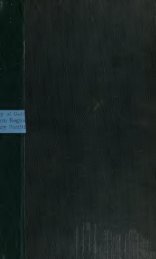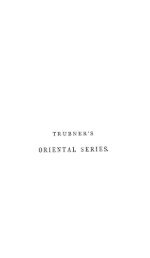Untitled
Untitled
Untitled
You also want an ePaper? Increase the reach of your titles
YUMPU automatically turns print PDFs into web optimized ePapers that Google loves.
NOTE XXXI. SHAYKH 'ABDU'LLAH 'ANSARI<br />
.<br />
163<br />
*<br />
i<br />
In this Anecdote (XXXVIII) two errors occur, for Avicenna acted<br />
as Minister to Shamsu'd-Dawla ibn Falthru'd-Dawla (brother, of the<br />
. above-mentioned M^jdu'd^-Dawla) at Hamadan, not to ''Ala'u'd JDawlj,<br />
whom he never served in this capacity, and who, moreover, lived no? at<br />
Ray, but at Isfahan, whither Avicenna 'went to attach himself to his<br />
Court in 412/1011-2 on Pfce death of Shamsu'd-Dawla apd the accession<br />
of his son Sama'u'd-Dawla. *<br />
, , Note XXXI. The Shaykh<br />
'Abdu'llah Ansari.<br />
(Text, p. 84; Persian notes, pp. 255-8.)<br />
The Shaykhu'l-Islam Abu" Isma'il 'Abdil'llah ibn Abi Mansiir Muhammad..^!-Ansari<br />
al-Khazraji al-Hirawi traced his pedigree to Abii<br />
Ayyub, a well-known companion of the Prophet. He was born on<br />
Sha'ban 2, ^96 (May 4, 1006), and died towards the end of A.H. 481<br />
(March, 1088). He was a notable traditionist and theologian, and, in<br />
spite of his fanatical attachment to the narrow and anthropomorphic<br />
doctrine's of the Hanbali school and his hatred of philosophers, who<br />
stood in terror of him, was accounted a leading Jjiifi. In Persia he is<br />
generally known as Khwaja 'Abdu'llah Ansari. In his Persian poems<br />
and quatrains, which are highly esteemed and have been repeatedly<br />
lithographed in Persia, he calls himself Ansari, Pir-i-Ansar, and Pir-i-<br />
Hiri. The prayers (Mundjdt] which he composed in Persian are also<br />
greatly admired. He used to lecture on the lives of the Saints, taking<br />
as his text the Tabaqdtu's-Si'ifiyya of as-Sulami, and adding observations<br />
of his own. One of his disciples took down these lectures in the<br />
ancient language of Herat, and on this version Jami based his wellknown<br />
Hagiography the Nafahdtu'l-Uns 1 . Ofhis numerous works there<br />
still exist, besides those already mentioned, a condemnation of Scholastic<br />
2<br />
Philosophy (Dhammrfl-Kaldni) in Arabic , a less rare treatise in the same<br />
language entitled Mandzilu's-Sd'irm ildl-Haqqi'l-Mubin, and in Persian<br />
a tract entitled Zddu'l- l<br />
Arifm ?<br />
'; and another, of which extracts are<br />
preserved 4<br />
called the "Book ,<br />
of Mysteries" (Kitdb-i-Asrdr).<br />
Mirza Muhammad gives, on the authority of the historian adh-<br />
Dhahabi, two narratives of attempts to discredit the Shaykh made by the<br />
philosophers whom he persecuted. On one occasion, when Sultan Alp<br />
Aislan the Saljuq^and his great Minister Nizamu'1-Mulk visited Hermit,<br />
they alsked him why he cursed Abu'l-Hasan al-Ash'ari, whose doctrines<br />
the Nizamu'1-Mulk* profesjed. After some hesitation he replied, "I do<br />
not recognize al-Ash'ari; him only I curse who does not believe that<br />
God is in .Heaven." On another occasion they produced a little copper<br />
> image, which, as they told the King, Ansari's anthropomorphism led<br />
him to worship, bu't he, being summoned and accused, so vehemently<br />
denied this calumny thit the King, convinced of his innocence, dismissed<br />
him with honour and punished his detractors.<br />
1 See pp. 1-3 of Nassau Lees's edition of this work. Mirza Muhammad informs<br />
me that a MS. of these lectures in their ancient original form 'exists in the Niir-i-<br />
'UthrJaniyya Library at Constantinople, and that M. Louis Massignon shewed, him<br />
the copy he had made of the portion referring to the celebrated Sufi al-Hallaj. I suppose<br />
that this is the MS. (No. 2500) to which M. Massignon refers in his striking work<br />
on the Kitdbrit-Tawdsin of al-Hallaj (Paris, 1913), p. 94, n. 4 ad calc.<br />
'<br />
2 Add. 27,520 of the British Museum.<br />
3 Rieu's Pers. Cat., p. 738.<br />
4 Ibid., p. 774.<br />
v








![La religione di Zarathustra nella storia religiosa dell' Iran [microform]..](https://img.yumpu.com/15970820/1/151x260/la-religione-di-zarathustra-nella-storia-religiosa-dell-iran-microform.jpg?quality=85)


